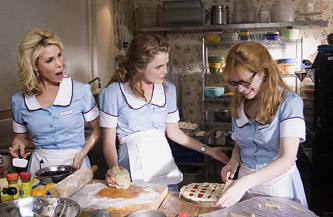Viking Night: Waitress
By Bruce Hall
January 28, 2014
BoxOfficeProphets.com

It takes a certain kind of man to break his wife down to nothing, and build her back up into a withered, cynical husk of her former self. But it’s not the kind of job that requires courage, talent, compassion, confidence, or even intelligence. We will find none of those things in the man we’re looking for. This rare breed will be a spineless, angry, undereducated man-child who didn’t marry his wife so much as he affixed himself to her life like a soul-killing parasite. Earl Hunterson (Jeremy Sisto) is just such a man, and his wife Jenna (Keri Russell) is the subject of this story.
Jenna works at Joe’s Pie Diner, which is like a regular diner, except the place on the menu where there should be food there is pie, and the regular food is at the bottom of the back page. She works with her two best friends Dawn (Adrienne Shelly) and Becky (Cheryl Hines). They’re all sweet, sassy Southern girls who make pies by day and find their lives in various states of PG-13 decay by night. Jenna wins the crap-fest by default thanks to her recently discovered pregnancy-a-la Earl. This throws a wrench in her elaborate master plan to leave him by winning a pie baking contest and running off to somewhere more upscale, presumably like Idaho.
Jenna’s only solace is the ancient art of pie making, and she’s so good at it that people come from miles around for a slice. But having a baby is kind of a big deal, specifically the kind that is solved by doctors, not pies. Jenna’s doctor is Dr. Jim Pomatter (Nathan Fillion), who’s reminiscent a cross between Han Solo and Hugh Grant, and maybe a little spaceship captain thrown in. The two of them hit it off and next thing you know, you’re watching yet another paint by numbers “Hunky Obstetrician Banging Pregnant Married Patient” stories. The only question now is how long it will take tor Jenna to leave Earl for Dr. Love, and which of her friends will find love first – the ditzy, kind hearted Dawn or the hot-in-a-dirty-way Becky?
Except it’s not quite that simple. And though I have a handful of nitpicks with certain details about certain characters, I love that Waitress never truly plays for cute. It’s a romantic comedy devoid of romance and there are elements of drama that more closely resemble humor, steeped in darkness borrowed from a completely different film. Russell gets to mine a lot of range here, playing an adorably cynical pie waitress who resents the child in her belly because it sprang from the seed of her sociopathic hillbilly husband. And as that husband, Sisto pours on the sleaze, lets it dry, and then pours on some more. The uncompromising way Waitress presents Earl’s douchebaggery is striking, giving the film an ominous foundation and coming as it is in the midst of such a quirky story.
Only it’s not THAT simple, either. “Quirky” implies self-consciousness, whereas to me, Waitress feels more like one of those films that has tangibly taken on the personality of its creator. The dialog is snappy but not in a pushy, Sorkin-esque or Mamet-like way. It’s in a way that suggests a conscious desire to write dialogue that doesn’t sound like dialogue, and it helps. Jenna’s struggle to assemble the wreckage of her life into something with meaning feels pretty genuine. Andy Griffith’s salty old entrepreneur sounds just like your nutty-but-loveable maternal grandfather, and everything he says is slightly twisted, but generally true. Dr. Pomatter is the seed of an interesting character; a decent but complex man who lets his passions lead him. But the film’s failure to define what motivates him to take the liberties he does is, in my eyes, the one issue I have with the story. But it’s a minor complaint; the rest of the film is too much fun not to enjoy.
There’s a dreamy, ironically humorous, slightly melancholy but ultimately hopeful vibe to Waitress. When I originally saw it I attributed this to the person who wrote and directed it, Adrienne Shelly. So, imagine how disappointed I was to discover that she’d died a few years prior, the victim of a home invasion. It’s doubly sad because despite some minor flaws, her final film is an offbeat, pleasant and promising film that treats its story, characters and audience with respect. It successfully develops a complex female lead without treating her like a prize, and the solutions to her struggles are never defined by the level of male intervention in them. Unfortunately, Waitress was Shelly’s first and last big break as a director, but sadder than this would have been had her film been left unfinished, or had never seen the light of day.
It’s a strong effort, and a fun film that makes you happier for having seen it and thus makes the world a little bit better just because it exists at all. It’s a legacy worth leaving behind.